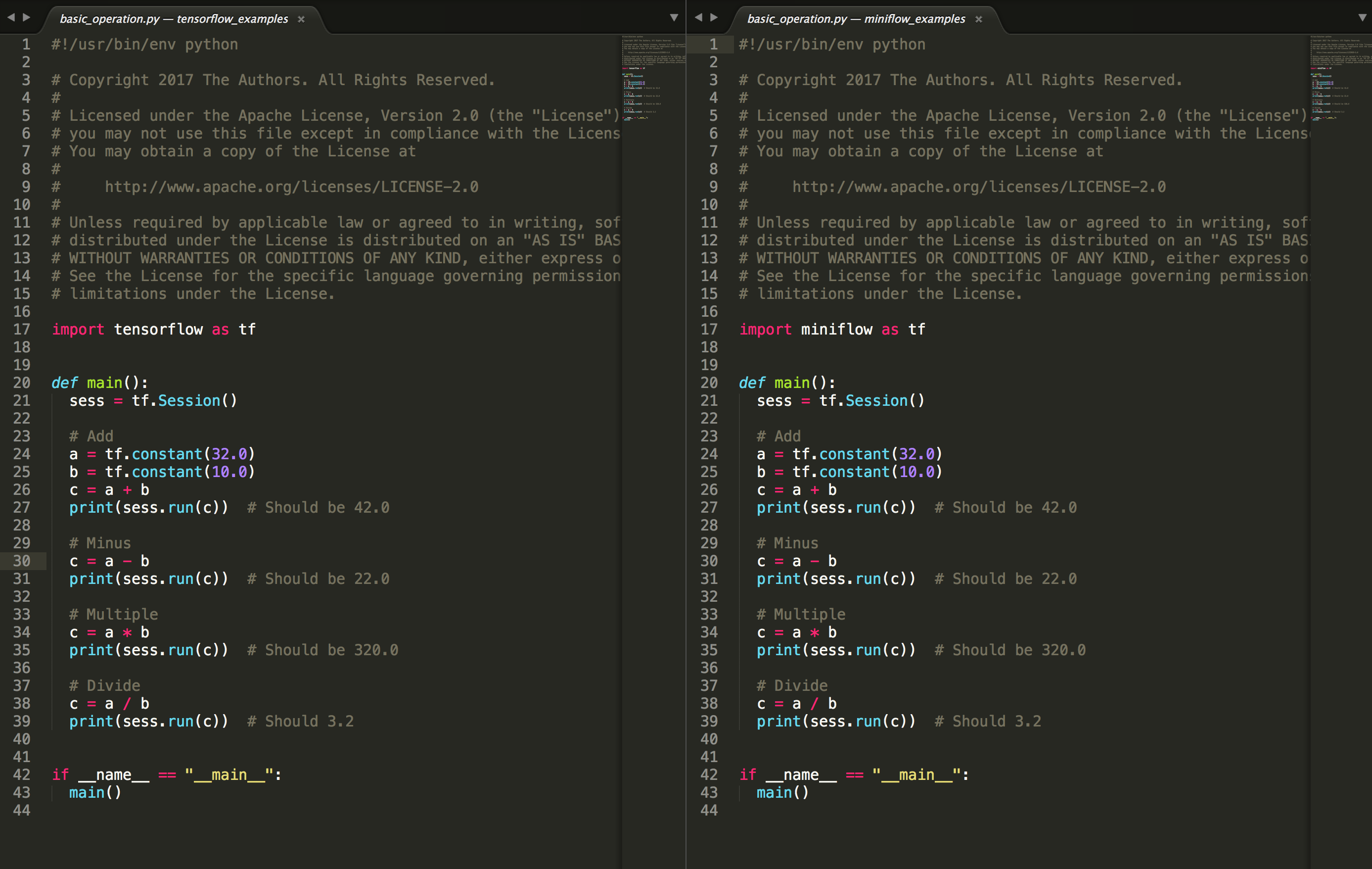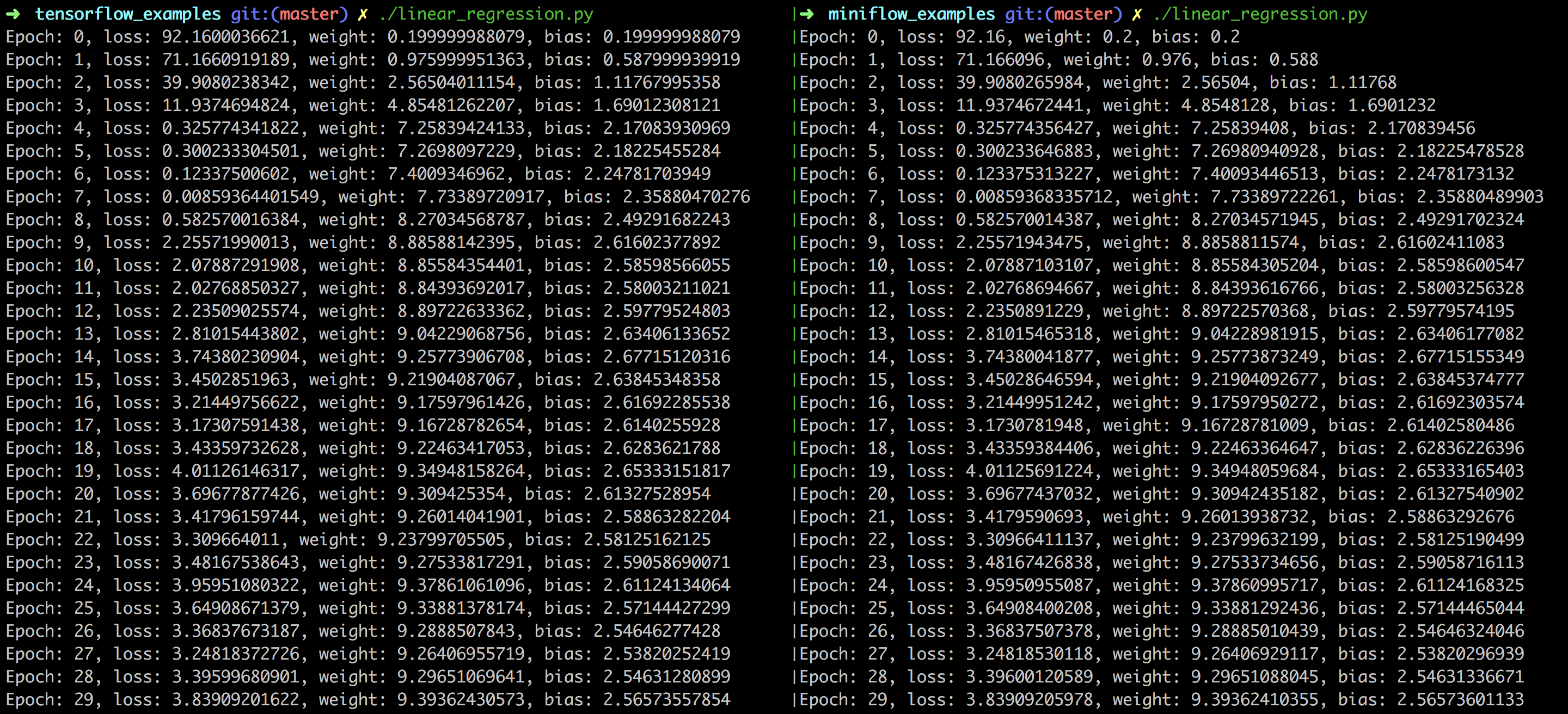tobegit3hub / Miniflow
Licence: apache-2.0
Minimal numerical computation library with TensorFlow APIs
Stars: ✭ 291
Programming Languages
c
50402 projects - #5 most used programming language
MiniFlow
Introduction
MiniFlow is the numerical computation library which implements TensorFlow APIs.
- Support math calculations and composited operations
- Support automatic partial derivative and chain rule
- Support operations in C++/Python backends with swig
- Support platforms like Linux/MacOS/Windows/Raspbian
- Support imperative and declarative computations
- Support the compatiable APIs with TensorFlow
Installation
Install with pip.
pip install miniflow
Or run with docker.
docker run -it tobegit3hub/miniflow bash
Usage
MiniFlow has compatiable APIs with TensorFlow and please refer to examples for more usage.
Basic operations
Run with TensorFlow.
import tensorflow as tf
sess = tf.Session()
hello = tf.constant("Hello, TensorFlow!")
sess.run(hello)
# "Hello, TensorFlow!"
a = tf.constant(10)
b = tf.constant(32)
sess.run(a + b)
# 42
Run with MiniFlow.
import miniflow as tf
sess = tf.Session()
hello = tf.constant("Hello, MiniFlow!")
sess.run(hello)
# "Hello, MiniFlow!"
a = tf.constant(10)
b = tf.constant(32)
sess.run(a + b)
# 42
Use placeholder
Run with TensorFlow.
import tensorflow as tf
sess = tf.Session()
a = tf.placeholder(tf.float32)
b = tf.constant(32.0)
sess.run(a + b, feed_dict={a: 10})
sess.run(a + b, feed_dict={a.name: 10})
# 42.0
Run with MiniFlow.
import miniflow as tf
sess = tf.Session()
a = tf.placeholder(tf.float32)
b = tf.constant(32.0)
sess.run(a + b, feed_dict={a: 10})
sess.run(a + b, feed_dict={a.name: 10})
# 42.0
Linear model
Run with TensorFlow.
def linear_regression():
epoch_number = 30
learning_rate = 0.01
train_features = [1.0, 2.0, 3.0, 4.0, 5.0]
train_labels = [10.0, 20.0, 30.0, 40.0, 50.0]
weights = tf.Variable(0.0)
bias = tf.Variable(0.0)
x = tf.placeholder(tf.float32)
y = tf.placeholder(tf.float32)
predict = weights * x + bias
loss = tf.square(y - predict)
sgd_optimizer = tf.train.GradientDescentOptimizer(learning_rate)
train_op = sgd_optimizer.minimize(loss)
with tf.Session() as sess:
sess.run(tf.global_variables_initializer())
for epoch_index in range(epoch_number):
# Take one sample from train dataset
sample_number = len(train_features)
train_feature = train_features[epoch_index % sample_number]
train_label = train_labels[epoch_index % sample_number]
# Update model variables and print loss
sess.run(train_op, feed_dict={x: train_feature, y: train_label})
loss_value = sess.run(loss, feed_dict={x: 1.0, y: 10.0})
print("Epoch: {}, loss: {}, weight: {}, bias: {}".format(
epoch_index, loss_value, sess.run(weights), sess.run(bias)))
Run with MiniFlow.
def linear_regression():
epoch_number = 30
learning_rate = 0.01
train_features = [1.0, 2.0, 3.0, 4.0, 5.0]
train_labels = [10.0, 20.0, 30.0, 40.0, 50.0]
weights = tf.Variable(0.0)
bias = tf.Variable(0.0)
x = tf.placeholder(tf.float32)
y = tf.placeholder(tf.float32)
predict = weights * x + bias
loss = tf.square(y - predict)
sgd_optimizer = tf.train.GradientDescentOptimizer(learning_rate)
train_op = sgd_optimizer.minimize(loss)
with tf.Session() as sess:
sess.run(tf.global_variables_initializer())
for epoch_index in range(epoch_number):
# Take one sample from train dataset
sample_number = len(train_features)
train_feature = train_features[epoch_index % sample_number]
train_label = train_labels[epoch_index % sample_number]
# Update model variables and print loss
sess.run(train_op, feed_dict={x: train_feature, y: train_label})
loss_value = sess.run(loss, feed_dict={x: 1.0, y: 10.0})
print("Epoch: {}, loss: {}, weight: {}, bias: {}".format(
epoch_index, loss_value, sess.run(weights), sess.run(bias)))
The computed gradient and the variables of the model are accurate.
Performance
We have more performance tests in benchmark.
Contribution
GitHub issues and pull-requests are highly appreciated and feel free to make your contribution.
Release to upload the official python package of miniflow in pypi.
python setup.py sdist upload
python setup.py sdist --format=gztar
twine upload dist/miniflow-x.x.x.tar.gz
Note that the project description data, including the texts, logos, images, and/or trademarks,
for each open source project belongs to its rightful owner.
If you wish to add or remove any projects, please contact us at [email protected].



